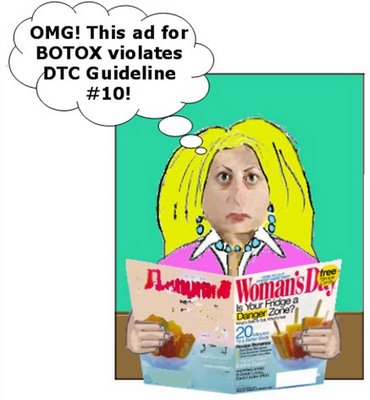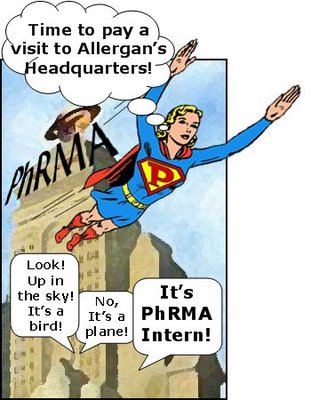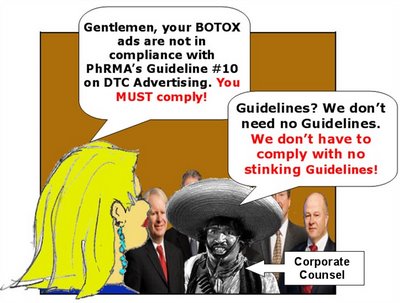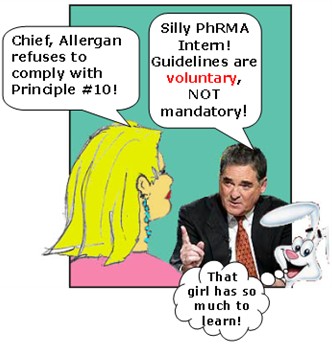Some day I'll meet up with Chris Truelove -- she works just down the road from me! For now, however, I'll just have to be content with reading "Pharma Blogs: Week in Review," the weekly e-newsletter Chris writes (subscribe here). This week's edition is a gem, and not only because she mentions me at least 3 times! She managed to cite every one of the posts I made this week to Pharma Marketing Blog! Thanks, Chris.
I don't think Chris will mind if I excerpt some of her comments here.
Chris cited several blogger comments about Jarvik, the "doctor" celebrity Lipitor spokesperson. She notes that uber-liberal Peter Rost at Brandweek's NRx and Ayn Rand groupie Peter Pitts over at Drug Wonks make strange bedfellows agreeing with one another on the Jarvik issue:
What I am very surprised at is that Mr. Pitts and Dr. Peter Rost at BrandWeekNRx actually agree that picking on Dr. Jarvik for not being a licensed physician is wrong. Dr. Rost came to Dr. Jarvik’s defense. "Quite frankly, I'm shaking my head a bit," Dr. Rost says. "It is one thing to go after celebrities who know nothing about medicine and another to go after a guy who happens to have contributed more to medicine than most practicing docs."
Obviously, there's "medicine" and then there's the "practice of medicine," which is a point Bob Ehrlich and I (two other strange bedfellows) focused and agreed on. Chris writes:
John Mack at the Pharmaceutical Marketing Blog had thought Dr. Jarvik was a practicing physician when the ads first aired. Now that Dr. Jarvik has been outed, Mr. Mack says, “I am not belittling the contribution Jarvik has made to medicine, but it does appear to me that the Lipitor ads are misleading consumers into believing that Jarvik is a doctor similar to the doctors they are used to seeing in real life -- one that treats patients and has experience with cholesterol medications. Why else would we believe him as an endorser of Lipitor?”
At DTC Perspectives’ blog, DTC in Perspective, Bob Ehrlich admitted that he was surprised to hear that Dr. Jarvik was not a licensed physician. “I assumed he was a leading cardiologist,” he says. “Of course that was my assumption, not something Lipitor ever said in their ads. Jarvik is what he says he is. He is a scientist who invented the artificial heart. Like many researchers who have a medical degree, they do not practice. I am sure; however, Jarvik knows a thing or two about the heart.” Although “Pfizer is not guilty of anything in a literal sense,” Mr. Ehrlich suggests that Pfizer put a clarifying statement on the commercial that states that Dr. Jarvik does not practice medicine.
Yes, Pfizer is not guilty of anything except a lack of transparency.
Speaking of using celebrities in DTC ads, Jarvik actually was MADE a celebrity in the public's eye BY the Lipitor ads. I mean, do you think Joe Sixpack ever heard of Jarvik BEFORE the ads aired? I don't think so. On the other hand, the Boniva commercials do not even have to mention Sally Field's name; everyone knows her! In other words, Pfizer CREATED the image of Jarvik as a world-renowned DOCTOR in the public's eye -- they even fooled an expert like Ehrlich into believing Jarvik was a practicing cardiologist who knows something about treating high cholesterol.
BTW, even a layperson like
Paul Winchell, the renowned ventriloquist, can invent an artificial heart, which he did BEFORE Jarvik did. In fact, the Winchell family claims that Jarvik STOLE Winchell's idea after forcing him to donate his patent to the University of Utah. Here's a comment I received to my October, 2006, post "
Lipitor's Jarvik: Fop or Flop?" that first "outed" Jarvik as possibly a closet gay guy (not that there's anything wrong with that):
I am offended by Dr. Robert Jarvik's claim to be the inventor of the artificial heart. It appears he's stretching the facts, perhaps due to what you alleged might be vanity. As a young medical student in the 1970s, he joined the research team on artificial organs at the University of Utah under Dr. Kolff. Dr. Kolff had convinced the inventor of a battery-powered artificial heart to donate his patent to the University. That man was Mr. Paul Winchell. Mr. Winchell invented the artificial heart in the 1950s and filed for a patent in 1961. Dr. Kolff requested he donate his research and the patent ten years later in 1971. Winchell was a pre-med student at Columbia at the time of his invention, but later dropped out. If you recognize his name, he earned his money for medical school through entertainment--as the famous Paul Winchell, with sidekicks Jerry Mahoney and Knucklehead Smiff. I believe this is why Dr. Jarvik does not acknowledge Winchell as the original inventor. Jarvik used air compression in his version of the artificial heart, and did indeed create the first one for use in humans. Winchell didn't agree with the air compression design and kept trying to get the University researchers to consider batteries for power, so patients would not be tied to a compressor (about the size of a briefcase with tubes to the body). Kolff and Jarvik distanced themselves from Winchell, and as far as I can determine, have never credited Winchell for 1) inventing the first artificial heart, or 2) dontating his patent to the medical community for the benefit of the world. You can read Winchell's side of the story at his site, www.paulwinchell.com. One last note--it's interesting that Dr. Jarvik is now going public on a national scale only after Winchell died in 2005. Spread the truth. ~Kimn Gollnick
BTW, I should note that the Lipitor ads are very careful to say that Jarvik invented the "Jarvik artificial heart" as opposed to any other type of "artificial heart." I bet the Pfizer lawyers were all over the ad agency on that point just to be sure that "Pfizer is not guilty of anything in a literal sense!"
 Yesterday, I received an email from Peter Rost entitled "Schering-Plough tries to silence upcoming BrandweekNRX article," in which he summarized correspondence between him and some lawyer at Schering-Plough regarding an expose he said he was writing for BrandweekNRx/BrandWeek. I believe the documents in that correspondence were also posted on NRx for a short time yesterday, but I can no longer find that post.
Yesterday, I received an email from Peter Rost entitled "Schering-Plough tries to silence upcoming BrandweekNRX article," in which he summarized correspondence between him and some lawyer at Schering-Plough regarding an expose he said he was writing for BrandweekNRx/BrandWeek. I believe the documents in that correspondence were also posted on NRx for a short time yesterday, but I can no longer find that post.











